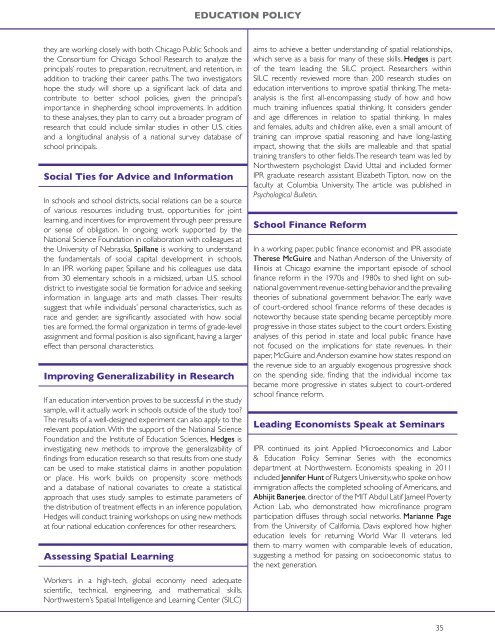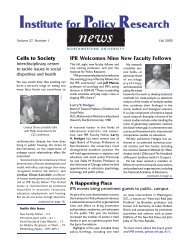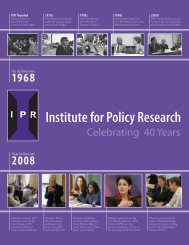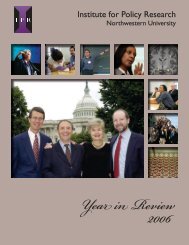Highlights of 2011 - Institute for Policy Research - Northwestern ...
Highlights of 2011 - Institute for Policy Research - Northwestern ...
Highlights of 2011 - Institute for Policy Research - Northwestern ...
Create successful ePaper yourself
Turn your PDF publications into a flip-book with our unique Google optimized e-Paper software.
Education <strong>Policy</strong><br />
they are working closely with both Chicago Public Schools and<br />
the Consortium <strong>for</strong> Chicago School <strong>Research</strong> to analyze the<br />
principals’ routes to preparation, recruitment, and retention, in<br />
addition to tracking their career paths. The two investigators<br />
hope the study will shore up a significant lack <strong>of</strong> data and<br />
contribute to better school policies, given the principal’s<br />
importance in shepherding school improvements. In addition<br />
to these analyses, they plan to carry out a broader program <strong>of</strong><br />
research that could include similar studies in other U.S. cities<br />
and a longitudinal analysis <strong>of</strong> a national survey database <strong>of</strong><br />
school principals.<br />
Social Ties <strong>for</strong> Advice and In<strong>for</strong>mation<br />
In schools and school districts, social relations can be a source<br />
<strong>of</strong> various resources including trust, opportunities <strong>for</strong> joint<br />
learning, and incentives <strong>for</strong> improvement through peer pressure<br />
or sense <strong>of</strong> obligation. In ongoing work supported by the<br />
National Science Foundation in collaboration with colleagues at<br />
the University <strong>of</strong> Nebraska, Spillane is working to understand<br />
the fundamentals <strong>of</strong> social capital development in schools.<br />
In an IPR working paper, Spillane and his colleagues use data<br />
from 30 elementary schools in a midsized, urban U.S. school<br />
district to investigate social tie <strong>for</strong>mation <strong>for</strong> advice and seeking<br />
in<strong>for</strong>mation in language arts and math classes. Their results<br />
suggest that while individuals’ personal characteristics, such as<br />
race and gender, are significantly associated with how social<br />
ties are <strong>for</strong>med, the <strong>for</strong>mal organization in terms <strong>of</strong> grade-level<br />
assignment and <strong>for</strong>mal position is also significant, having a larger<br />
effect than personal characteristics.<br />
Improving Generalizability in <strong>Research</strong><br />
If an education intervention proves to be successful in the study<br />
sample, will it actually work in schools outside <strong>of</strong> the study too?<br />
The results <strong>of</strong> a well-designed experiment can also apply to the<br />
relevant population. With the support <strong>of</strong> the National Science<br />
Foundation and the <strong>Institute</strong> <strong>of</strong> Education Sciences, Hedges is<br />
investigating new methods to improve the generalizability <strong>of</strong><br />
findings from education research so that results from one study<br />
can be used to make statistical claims in another population<br />
or place. His work builds on propensity score methods<br />
and a database <strong>of</strong> national covariates to create a statistical<br />
approach that uses study samples to estimate parameters <strong>of</strong><br />
the distribution <strong>of</strong> treatment effects in an inference population.<br />
Hedges will conduct training workshops on using new methods<br />
at four national education conferences <strong>for</strong> other researchers.<br />
Assessing Spatial Learning<br />
aims to achieve a better understanding <strong>of</strong> spatial relationships,<br />
which serve as a basis <strong>for</strong> many <strong>of</strong> these skills. Hedges is part<br />
<strong>of</strong> the team leading the SILC project. <strong>Research</strong>ers within<br />
SILC recently reviewed more than 200 research studies on<br />
education interventions to improve spatial thinking. The metaanalysis<br />
is the first all-encompassing study <strong>of</strong> how and how<br />
much training influences spatial thinking. It considers gender<br />
and age differences in relation to spatial thinking. In males<br />
and females, adults and children alike, even a small amount <strong>of</strong><br />
training can improve spatial reasoning and have long-lasting<br />
impact, showing that the skills are malleable and that spatial<br />
training transfers to other fields. The research team was led by<br />
<strong>Northwestern</strong> psychologist David Uttal and included <strong>for</strong>mer<br />
IPR graduate research assistant Elizabeth Tipton, now on the<br />
faculty at Columbia University. The article was published in<br />
Psychological Bulletin.<br />
School Finance Re<strong>for</strong>m<br />
In a working paper, public finance economist and IPR associate<br />
Therese McGuire and Nathan Anderson <strong>of</strong> the University <strong>of</strong><br />
Illinois at Chicago examine the important episode <strong>of</strong> school<br />
finance re<strong>for</strong>m in the 1970s and 1980s to shed light on subnational<br />
government revenue-setting behavior and the prevailing<br />
theories <strong>of</strong> subnational government behavior. The early wave<br />
<strong>of</strong> court-ordered school finance re<strong>for</strong>ms <strong>of</strong> these decades is<br />
noteworthy because state spending became perceptibly more<br />
progressive in those states subject to the court orders. Existing<br />
analyses <strong>of</strong> this period in state and local public finance have<br />
not focused on the implications <strong>for</strong> state revenues. In their<br />
paper, McGuire and Anderson examine how states respond on<br />
the revenue side to an arguably exogenous progressive shock<br />
on the spending side, finding that the individual income tax<br />
became more progressive in states subject to court-ordered<br />
school finance re<strong>for</strong>m.<br />
Leading Economists Speak at Seminars<br />
IPR continued its joint Applied Microeconomics and Labor<br />
& Education <strong>Policy</strong> Seminar Series with the economics<br />
department at <strong>Northwestern</strong>. Economists speaking in <strong>2011</strong><br />
included Jennifer Hunt <strong>of</strong> Rutgers University, who spoke on how<br />
immigration affects the completed schooling <strong>of</strong> Americans, and<br />
Abhijit Banerjee, director <strong>of</strong> the MIT Abdul Latif Jameel Poverty<br />
Action Lab, who demonstrated how micr<strong>of</strong>inance program<br />
participation diffuses through social networks. Marianne Page<br />
from the University <strong>of</strong> Cali<strong>for</strong>nia, Davis explored how higher<br />
education levels <strong>for</strong> returning World War II veterans led<br />
them to marry women with comparable levels <strong>of</strong> education,<br />
suggesting a method <strong>for</strong> passing on socioeconomic status to<br />
the next generation.<br />
Workers in a high-tech, global economy need adequate<br />
scientific, technical, engineering, and mathematical skills.<br />
<strong>Northwestern</strong>’s Spatial Intelligence and Learning Center (SILC)<br />
35

















